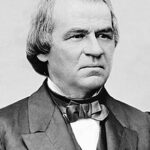The Historic Veto Decision
President Andrew Johnson vetoed the Johnson Civil Rights Act of 1866 on March 27, 1866. This landmark legislation aimed to grant citizenship and equal rights to freed slaves. Johnson argued the bill exceeded federal authority and violated states’ rights. His veto message claimed the legislation was unconstitutional and unnecessary. ⚠️ The decision shocked Republican allies who expected presidential support for Reconstruction efforts.
Constitutional Arguments and Racial Motivations
Johnson’s veto relied on strict constitutional interpretation and states’ rights doctrine. He claimed Congress lacked authority to define citizenship for former slaves. The president argued individual states should determine civil rights for their residents. 📊 However, historians note Johnson’s deep commitment to white supremacy influenced his decision. His racist beliefs shaped his opposition to federal civil rights protections.
Congressional Response and Override
Congress responded swiftly to Johnson’s unexpected veto of civil rights legislation. Republican leaders organized an unprecedented override effort in both chambers. 🔥 The House voted 122-41 to override Johnson’s veto on April 6, 1866. Three days later, the Senate followed with a 33-15 override vote. This marked the first congressional override of major presidential legislation in American history.
Impact:
Constitutional Crisis and Presidential Power
Johnson’s veto created an immediate constitutional crisis between executive and legislative branches. The successful congressional override established precedent for legislative supremacy during Reconstruction. 🔥 This conflict fundamentally altered the balance of presidential power for decades. Future presidents would face stronger congressional opposition to controversial vetoes. The crisis demonstrated limits of executive authority during national emergencies.
Deepening Racial Divisions
The veto deepened racial tensions across the reunited nation significantly. Johnson’s opposition to the Johnson Civil Rights Act encouraged white supremacist resistance movements. Southern states interpreted the veto as presidential endorsement of racial discrimination. 📉 African Americans lost faith in federal protection of their newly gained freedoms. The decision emboldened violent groups like the Ku Klux Klan to target freed slaves.
Long-term Political Consequences
Johnson’s veto permanently damaged his relationship with Republican Party leadership. Congressional Republicans began impeachment proceedings against the president in 1868. 🌍 The override victory strengthened radical Republican influence over Reconstruction policies. This shift led to more aggressive federal intervention in Southern states. The decision ultimately contributed to Johnson’s political isolation and historical legacy as a failed president.
